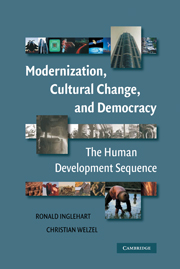Book contents
- Frontmatter
- Contents
- Dedication
- Acknowledgments
- Foreword by Hans-Dieter Klingemann
- Introduction
- PART I THE FORCES SHAPING VALUE CHANGE
- PART II THE CONSEQUENCES OF VALUE CHANGE
- 7 The Causal Link between Democratic Values and Democratic Institutions: Theoretical Discussion
- 8 The Causal Link between Democratic Values and Democratic Institutions: Empirical Analyses
- 9 Social Forces, Collective Action, and International Events
- 10 Individual-Level Values and System-Level Democracy: The Problem of Cross-Level Analysis
- 11 Components of a Prodemocratic Civic Culture
- 12 Gender Equality, Emancipative Values, and Democracy
- 13 The Implications of Human Development
- Conclusion: An Emancipative Theory of Democracy
- Bibliography
- Index
10 - Individual-Level Values and System-Level Democracy: The Problem of Cross-Level Analysis
Published online by Cambridge University Press: 05 September 2012
- Frontmatter
- Contents
- Dedication
- Acknowledgments
- Foreword by Hans-Dieter Klingemann
- Introduction
- PART I THE FORCES SHAPING VALUE CHANGE
- PART II THE CONSEQUENCES OF VALUE CHANGE
- 7 The Causal Link between Democratic Values and Democratic Institutions: Theoretical Discussion
- 8 The Causal Link between Democratic Values and Democratic Institutions: Empirical Analyses
- 9 Social Forces, Collective Action, and International Events
- 10 Individual-Level Values and System-Level Democracy: The Problem of Cross-Level Analysis
- 11 Components of a Prodemocratic Civic Culture
- 12 Gender Equality, Emancipative Values, and Democracy
- 13 The Implications of Human Development
- Conclusion: An Emancipative Theory of Democracy
- Bibliography
- Index
Summary
Misinterpretations of the Ecological Fallacy
As we have seen, socioeconomic development brings rising emphasis on self-expression values, which is conducive to liberal democracy. We have analyzed these linkages at the societal level, using the proportion of people emphasizing self-expression values in each nation, to measure the impact of mass attitudes on democracy. Because democracy exists only at the societal level, this is the appropriate level (indeed, the only possible level) at which to analyze the process, although these values were originally measured at the individual level. But the analysis of cross-level linkages, such as the one between individual-level values and societal-level democracy, is somewhat unusual (since it requires comparable survey data from scores of societies, which are rarely available) and it remains widely misunderstood. Thus, for example, Seligson (2002) claims that the strong aggregate-level correlations that Inglehart has found between political culture and stable democracy are “spurious” because Seligson does not find strong correlations between Inglehart's individual-level indicators of political culture and individual-level support for democracy, claiming that the cross-level linkage between mass values and democracy represents an “ecological fallacy.”
Everyone has heard of the ecological fallacy, a problem that can arise when individual-level data are aggregated to the societal level. But the problem is often misunderstood, even by prominent social scientists. Because aggregating individual-level data to the societal level is done in this book's most central analyses, let us take a closer look at how it works.
Information
- Type
- Chapter
- Information
- Modernization, Cultural Change, and DemocracyThe Human Development Sequence, pp. 231 - 244Publisher: Cambridge University PressPrint publication year: 2005
